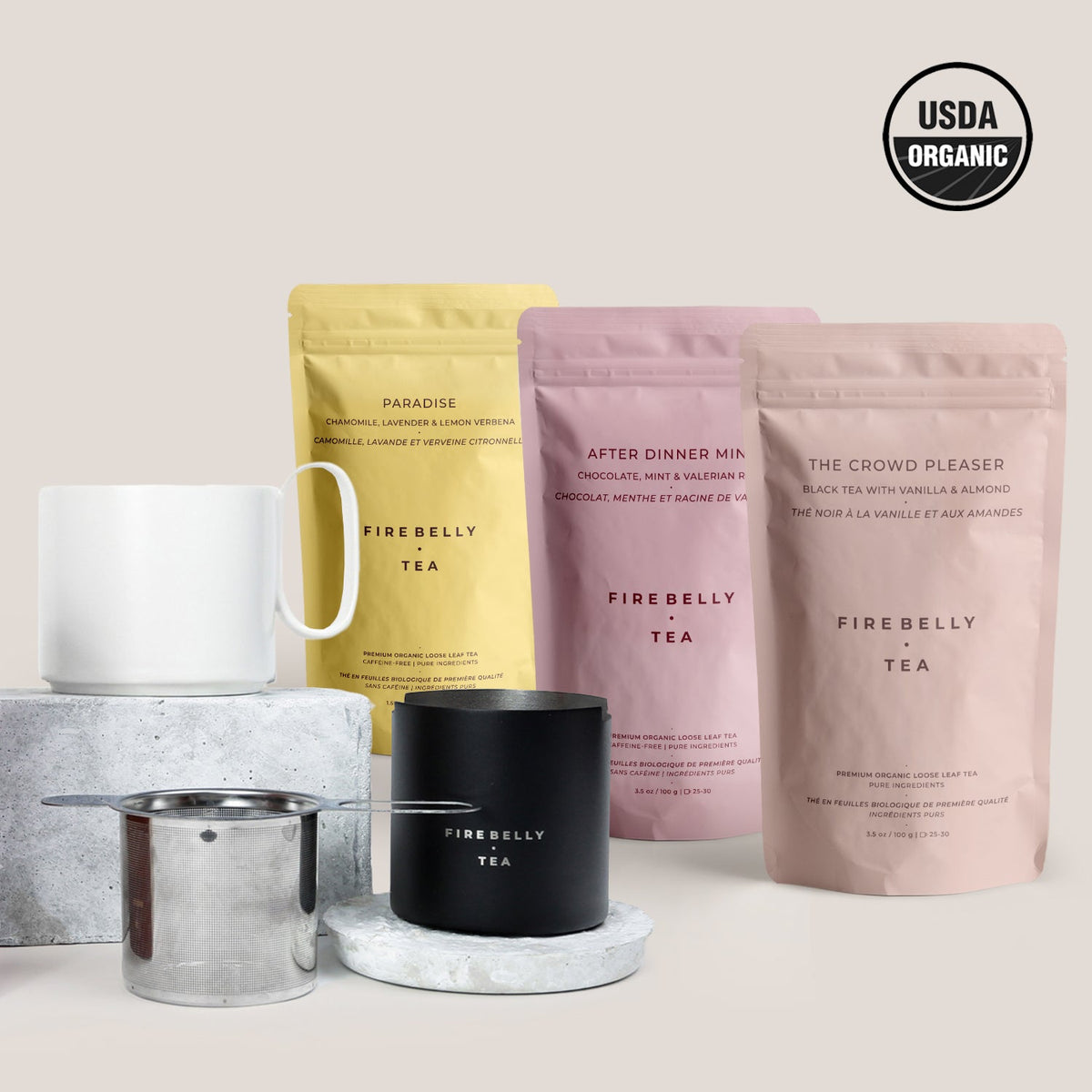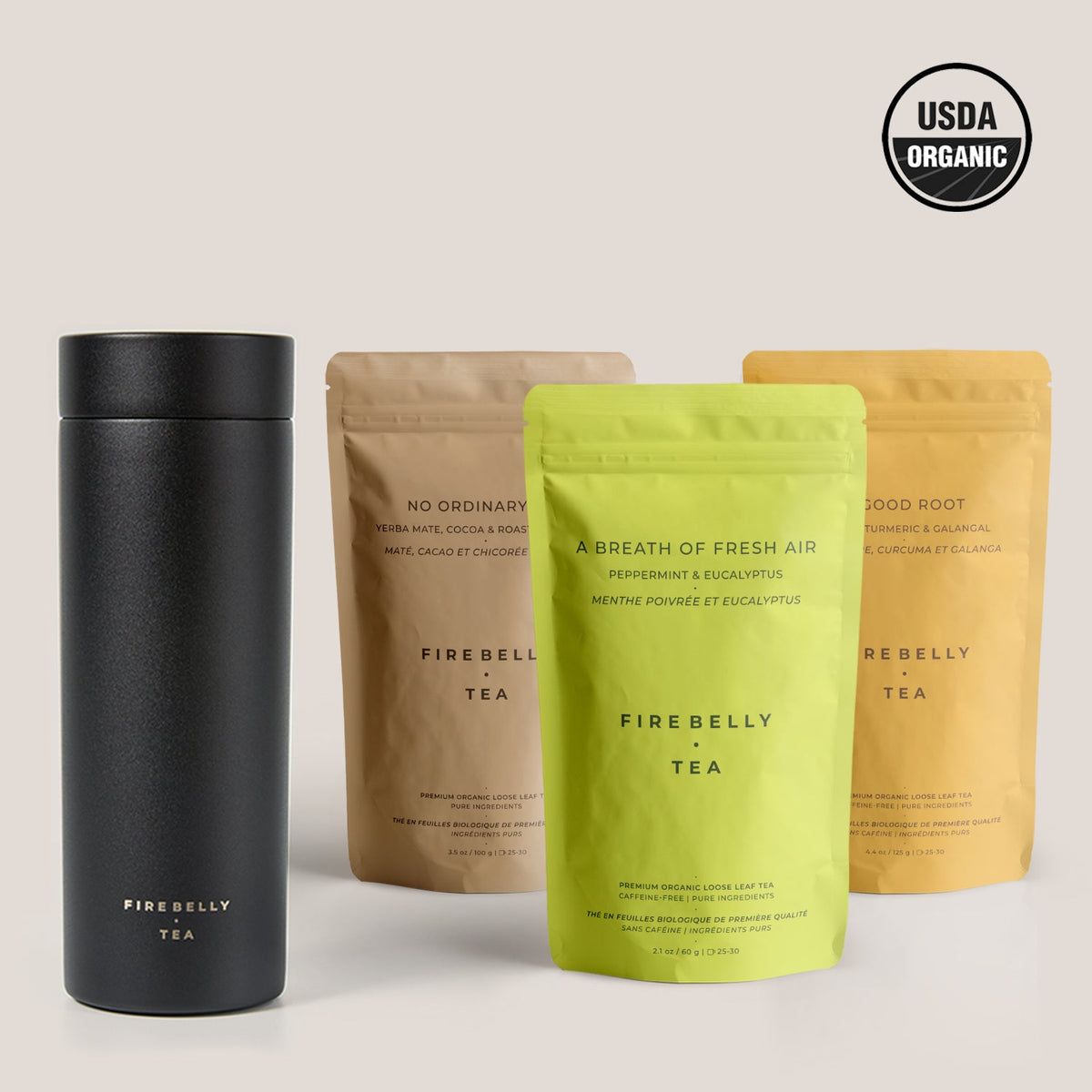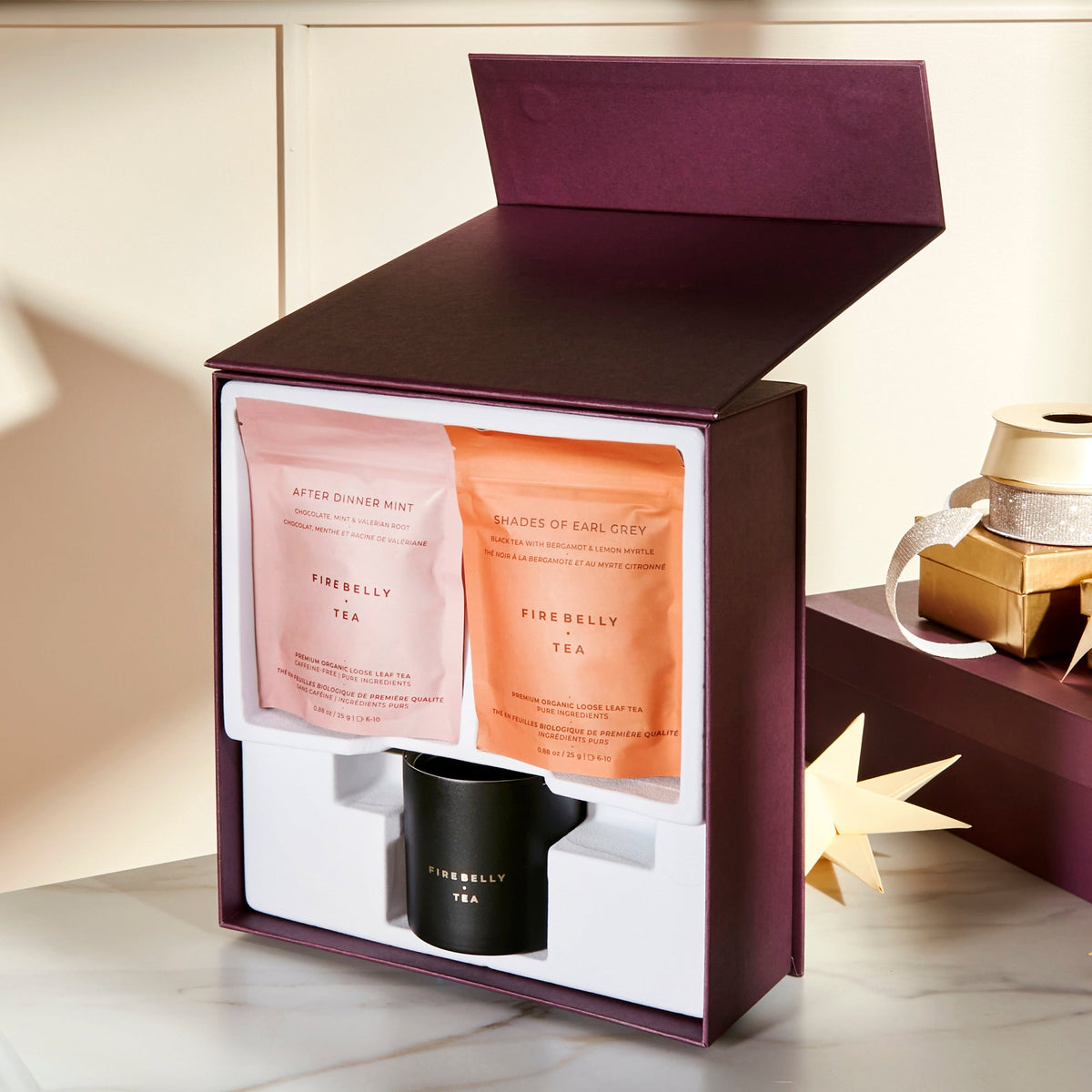Many of us have enjoyed a sweet licorice candy, but there is more to licorice than just this delectable treat. You can brew it into a delightful tea with many health benefits, including better digestion, healthier skin, and reduced inflammation.
In this article, we delve into the extensive health benefits of licorice root tea, explore its historical significance, and how the root is processed to create a soothing cup of tea. We also explore the many ways it contributes to overall health and well-being.
What Makes Licorice a Sweet, Soothing, and Smooth Herbal Tea
Licorice root tea is an herbal infusion made by steeping the dried roots of the licorice plant, scientifically known as Glycyrrhiza glabra, in hot water to create a sweet and delightful beverage. To make the tea, the plant's roots are harvested and then aged between 3 and 4 years to bring out the optimal potency of the plant compounds.
Licorice tea boasts a distinctive and sweet flavor profile that distinguishes it from other herbal infusions. The primary flavor many of us are familiar with comes from the licorice root, which contains a compound called glycyrrhizin. This compound gives licorice root tea a natural sweetness reminiscent of black licorice candy. Let's take a closer look at the various flavor profiles that come from licorice root:
-
Sweetness - The most prominent characteristic of licorice tea is its naturally sweet taste. This makes it an excellent choice for those who have a disposition for all those sweet treats in life but want to reduce the amount of sugar they consume.
-
Anise-like notes - Licorice root shares similar flavor compounds with anise, fennel, and star anise, similar to a black licorice flavor. These flavors add a complex layer to the overall taste profile, giving a mildly spicy and aromatic undertone.
-
Mild earthiness - Underneath all that sweetness and delicate anise notes, licorice tea may also have a mild earthy undertone. This grounding flavor profile can give the tea a more balanced and deep flavor.
-
Smooth and soothing - Licorice tea has just enough sweetness without overpowering its smooth and soothing attributes. This makes licorice tea a perfect choice for those who want a comforting and gentle herbal infusion.
-
Palate-coating - Licorice tea has a unique quality of leaving a subtle coating on the palate, giving your mouth some extra sensory work. Sipping a cup of licorice root tea will provide a lingering and satisfying experience long after the cup is empty.
-
Versatility in blends - While licorice root tea is often enjoyed on its own, it also pairs well with various other herbs, spices, and tea leaves.
It's worth noting that individual preferences vary, and while many people appreciate the unique sweetness of licorice tea, others may find it an acquired taste. If you enjoy the flavor of black licorice and want a caffeine-free beverage, licorice tea is a delightful and healthful choice.
History of Licorice Root Tea
The story of licorice root tea, also known as liquorice tea, dates back thousands of years to the ancient civilizations of ancient Egypt, China, and Greece. During these early times, liquorice tea and the liquorice root were revered for their therapeutic properties, often used as herbal medicine to alleviate various ailments.
The Greek physician Hippocrates, considered the father of modern medicine, was one of the first to point out the medicinal potential of licorice root. He recognized its ability to soothe respiratory issues and digestive discomfort.
Licorice root was also a big part of traditional Chinese medicine. According to ancient traditional Chinese healers, licorice root was used for treating a wide range of conditions, from digestive disorders to emotional and mental stress. Over time, licorice root became a staple in herbal remedies across the globe, earning its reputation as a versatile healer.
What's The Difference Between Licorice Root Extract and Licorice Extract
Licorice root extract and licorice extract are terms that are often used interchangeably, but there can be slight differences depending on the specific product and how it's labeled. A simple way to describe it is that both terms refer to extracts derived from the licorice plant (Glycyrrhiza glabra) and contain the bioactive compounds responsible for the plant's characteristic flavor and potential health benefits.
However, here are the more notable differences to be aware of when looking for products containing licorice:
-
Licorice Root Extract - This term refers to an extract derived from the root of the licorice plant to make various licorice root products. The extraction of the roots may include methods like boiling, soaking, or steam distillation. Licorice root products can come in various forms, including liquid extracts, powders, or capsules.
-
Licorice Extract - This is a more general term used to describe an extract from the licorice plant that may include various plant parts, such as the roots, leaves, or stems. Licorice extract may or may not necessarily specify that it is exclusively from the root, so it could be a combination of different plant components. This type of extract is more commonly used in products such as black licorice candies, herbal supplements, skincare, and traditional medicine.
Health Benefits of Licorice Root
Today, licorice root extract is under the microscope of scientific research to understand these healing properties further. Let's take a deeper look at how licorice root extract and licorice extract in its many forms can help heal systems of the body and bring more balance back to your health.
#1. Better Digestive Health
One of this powerful plant's most well-documented health properties is its ability to help heal the gut. Since its early beginnings, this herbal tea has long been celebrated for its digestive benefits. One of the main reasons for this is that it contains anti-inflammatory properties that help soothe the digestive tract.
It soothes the digestive tract, helping to ease conditions like indigestion, bloating, and heartburn. Sipping a warm cup of licorice root tea may help stimulate mucin production, a protective layer in the stomach, promoting a healthy gut environment.
#2. Provide Respiratory Support And Soothe Sore Throats
Many herbal teas help soothe a sore throat. Even a nice warm cup of black tea with some honey and lemon can do wonders for a sore throat or rough cough. The soothing qualities of licorice root go beyond keeping a cough at bay and can help promote better respiratory health.
Traditionally used as a natural remedy to address coughs and respiratory congestion, licorice root tea alleviates symptoms of bronchitis and asthma, such as a sore throat and persistent cough. It has high-quality antimicrobial properties that can assist in clearing mucus from the airways, relieving upper respiratory infections and discomfort such as a sore throat. Breathe better with this herbal tea!
#3. Stress Reduction and Adrenal Support
Licorice root contains compounds that may support the adrenal glands, which play a crucial role in managing stress and anxiety and all the symptoms that go with it. By modulating cortisol levels in the body, licorice root tea may help reduce stress and give the immune system a much-needed overall boost.
#4. Anti-Inflammatory Effects
The anti-inflammatory properties of licorice root come from glycyrrhizin and other bioactive compounds. Regular consumption of this tea and a diet rich in anti-inflammatory foods may help reduce inflammation, contribute to better joint health, reduce the onset of arthritis, and bring mobility back into a person's life.
#5. Hormonal Balancing Effects
One of the most surprising benefits of licorice is its ability to support hormonal balance, especially in women. This is due to phytoestrogens, or plant compounds that may mimic the effects of estrogen in the body. This incredible attribute has led to licorice root being used to help address symptoms of hormonal imbalance, such as menstrual irregularities and menopausal discomfort.
#6. Antioxidant Boosting Properties
Licorice root tea is loaded with flavonoids and other antioxidants, which help combat oxidative stress in the body. Antioxidants play a crucial role in neutralizing free radicals or unstable molecules that can damage cells and contribute to the aging process and the development of various chronic diseases such as cancer and Alzheimer's. Drinking liquorice tea is a great way to get a blast of flavor but keep those free radicals at bay.
#7. Improves Cardiovascular Health
Licorice root tea can significantly improve cardiovascular health due to compounds such as flavonoids and glycyrrhizic acid. Flavonoids are well known for their antioxidant effects, which can help reduce oxidative stress in the cardiovascular system, making significant improvements to overall heart health.
By neutralizing free radicals, the glycyrrhizic acid in licorice root tea helps protect the body's delicate blood vessels and arteries from damage while potentially lowering the risk of atherosclerosis, heart disease, and related complications.
Glycyrrhizin may also assist in reducing high blood pressure by modulating cortisol levels and enhancing fluid balance. High blood pressure is linked to several health problems, such as heart attacks and stroke. Enjoying a cup of licorice root tea gives you a flavorful brew and may reduce high blood pressure and benefit a healthy lifestyle, supporting better cardiovascular well-being.
#8. Weight Management
Licorice candies aren't a great idea if you want to shed a few pounds, but sipping a cup of licorice tea is perfect for a sweet tooth without the added calories. The tea is naturally sweet, and its compounds may help influence fat storage, metabolism, and body weight. Although further research is needed to fully understand the extent of licorice root's impact on weight loss, you can cut your sugar cravings while satisfying your sweet tooth by sipping a cup of this delightful tea.
#9. Healthier Skin
Licorice, particularly in licorice root extract, is well-known for its potential benefits in tackling troublesome skin conditions. Its anti-inflammatory, antioxidant, and antibacterial properties make it a natural product to treat skin conditions like eczema and psoriasis.
When applied topically, the glycyrrhizin extract in licorice root helps soothe irritated skin and may reduce redness and swelling associated with inflammatory skin conditions. This mighty plant is an ideal ingredient in skincare formulations and topical gels designed to address hyperpigmentation and dark spots. Additionally, adding licorice root extract to your diet has been shown to inhibit melanin production.
The natural compounds in licorice root are great for promoting overall skin health. However, it's important to note that individual reactions to a topical gel or skincare product may vary. Consult with a dermatologist before incorporating licorice-based products into a skincare regimen is always best.
Side Effects of Taking Licorice
It's important to note that the active compound in licorice responsible for its sweet taste and potential health effects is glycyrrhizin, and with most people consuming glycyrrhetinic acid, it is entirely safe. Although natural products like this are generally safe, some people must keep licorice consumption to a moderate minimum.
Too much licorice can create an excessive intake of glycyrrhizin. This compound may cause adverse effects in people sensitive to licorice and cause problems such as increased blood pressure and low potassium levels. The combination of low potassium and blood pressure can cause health conditions such as heart disease or kidney disease.
Aside from causing low potassium levels, here are other considerations when taking licorice.
-
It is best not to consume licorice root if you are also taking blood thinners, as it can negatively affect the medication and create adverse effects in the body.
-
Some individuals may be hypersensitive to licorice, experiencing allergic reactions or health conditions like gastric irritation.
Fall in Love With Licorice
Licorice is more than a great-tasting tea. This potent plant is a natural remedy that can help with several systems of the body. Whether you want to alleviate symptoms of the respiratory system, such as a scratchy throat, give your skin a healthy glow, and aid healthy digestion by taking care of digestive problems such as an upset stomach, licorice is the way to go.
We always recommend fresh ingredients over tea bags when looking for a tea blend that uses licorice. You'll get more of the flavor and healthy compounds. If you love the taste of licorice root tea, here's a unique blend from Firebelly that gives you a fresh blast of licorice root mixed with bold and distinct flavors of ginger, galangal, moringa, and turmeric.










